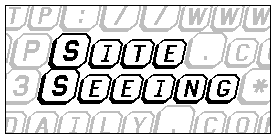 MIDI
File Wars! MIDI
File Wars!
The world of internet MIDI music sites has been in shock for several
weeks, following some fairly hefty copyright lawsuits aimed at large MIDI
website owners. The message from those with legal clout is clear - don't
publish copyright MIDI files on the web without permission!
If the above doesn't mean much to you then a few words of introduction
are probably in order. MIDI is an acronym for Musical Instrument Digital
Interface - an electronic standard for musical instructions sent between
electronic musical instruments and computers. A MIDI file contains a set
of instructions which can be interpreted to recreate a piece of music. A
good analogy is the piano roll used in pianolas - the music can be recreated,
but no-one can be quite sure how similar the recreation is to the composer
or maker's original intentions! MIDI files are music files, but quite how they
sound depends on the computer or MIDI synthesiser which converts the
instructions back into music.
The popularity of the internet has really launched the MIDI file as a
medium for spreading music. The current state of the net, where many people
connect over phone lines, often at low speeds, has made MIDI files ideal
for adorning websites with music. The MIDI files are small - they contain
only the instructions about how to play each note, and not the sound waveform
of the notes themselves - and so they can be downloaded very quickly, often
nearly instantaneously.
MIDI Files at Music & Vision
Over our first two months, we have made quite considerable use of MIDI
files here at Music & Vision, mostly as illustrations. If you
read our first issue on January 1st this year, you'll remember the MIDI Fanfare written especially for us by the composer
Adrian Williams. (Your computer may be able to play this fanfare if you
select the link above, and there are other examples of Adrian's MIDI music
on his website).
 Our other main use of MIDI files has been to illustrate Professor
Wilfrid Mellers' outstanding series Harmony:
functional and dysfunctional. Our MIDI files here are usually accompanied
by the symbol to the left. On many computer systems, the associated music
will play if the MIDI symbol is selected. Our other main use of MIDI files has been to illustrate Professor
Wilfrid Mellers' outstanding series Harmony:
functional and dysfunctional. Our MIDI files here are usually accompanied
by the symbol to the left. On many computer systems, the associated music
will play if the MIDI symbol is selected.
Whilst MIDI files provide a useful way to illustrate points in music,
the traditional view is that they're not really suitable for serious music,
because of the lack of control over how the sound is rendered on
the listener's computer. Various composers are now writing music especially
for MIDI performance, however, and this has tended to increase MIDI file
respectability! |
Over the past few years, many thousands of websites containing MIDI music
have appeared, and many of these sites' owners have 'harvested' MIDI files
from elsewhere on the web, from monitoring newsgroups and mailing lists
or by email trading. The copyright situation regarding MIDI files has been
largely unknown (or ignored) - as explained above, MIDI files are
different animals to digitized sound files, and many people have assumed
that normal sound recording copyright, broadcast and performance laws do
not apply.
The law may soon be changing regarding MIDI, at least in the United States,
and website owners may be forced to pay performance royalties to the collection
agencies such as ASCAP, BMI, PRS, SACEM etc. for copyright material.
One such site, MIDI Haven, was closed down completely in February
1999 following FBI intervention. The owner had apparently published commercial
MIDI files with copyrights held by Stephen Kern of the Trycho Corporation,
Acuff Rose Music Publishing, EMI Music, Harry Fox Agency, Laminations Music,
MCA Music Publishing, Polygram Music, Realsongs, the Walt Disney Music Company
and Warner Music Publishing. MIDI Haven's owner has been sued for
$6.6 million!
The sinister side of this story relates to textual copyright information
which can be stored inside a MIDI file. Many commercial (and other) producers
of MIDI files will often use these text areas to 'tag' their files with author,
copyright and other information. Most MIDI editors allow textual material to be
added or removed very easily. MIDI
Haven's owner claims that she received the disputed files without any
embedded copyright information - the inference being that someone else -
a third party - had already removed the copyright warnings.
We're told that Stephen Kern has downloaded the entire contents of many
of the larger MIDI websites, storing the files on CDs, and that he is sifting
through them all, listening for his copyright material, suing the site owners
where appropriate, and attempting to reach settlements out of court.
Hopefully this current storm will blow over, the law will be clarified,
and MIDI website owners will be more careful in future to verify the source
of the files they publish! Looking on the positive side, the current lawsuits
could well be good news for those composing their own MIDI files - they may end
up with new rights and new opportunities to make money.
Other articles about MIDI legal action
|
Copyright © Keith Bramich, March 2nd
1999.
More site seeings >>
|